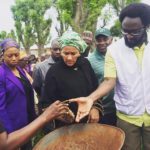For some of you that are familiar with the Lagos mainland, when you say you are going to Yaba, it means you are going shopping just by the railway. In the 19th century, Yaba was known as the host of a railway garage market where Lagosians buy “second – hand clothings”. Digitalization in the 21st century has rewritten the narrative of the town to the technology hub of Nigeria.” We now have 60 technology companies in and around Yaba, this is something fascinating for us, as it was only us and the University of Lagos. When we moved here in 2012” Bosun Tijani, the CEO of Co – Creation Hub affirmed in his opening remarks for the 2016 Social Change Summit.
Amidst several tensions in the country, on June 23, 2016 about 80 participants gathered around the popular Herbert Macaulay space of Co – Creation Hub to discuss how to attract talent, resources and creativity to address Nigeria’s most pressing social challenges. I might not be right, but it seems the event greatly focused on Media and Digital Innovations. And why not? Every conference now have that word – innovation! Whenever you are in Lagos, you must innovate to get to events early, exactly what I did, by flagging a motorbike rider, to get me to the event, all the way from Ikeja! Please don’t inform Ambode, I only wanted to avoid the painstaking Lagos traffic, and remember, I came from Abuja.
The hall was enlivened by the keynote speech of Ibukun Awosika, the Chairman First Bank Group, who to me appeal more to the female gender, as I observe closely all the female entrepreneurs, in the room, nodding to every of her lines. Maybe, I am the one that is not a female activist, but the good news was that her thoughts on rethinking a was quite electric. “When they ask you for your state of origin, erase it, and add your state of residence, likewise we should start thinking of how we have our talents come together to start up innovative solutions to our growing problems” Awosika mentioned. But is Nigeria really taken apart by the about three hundred and sixty something tribes in the country. She further said “There are three hundred and something tribes in Nigeria, so can you create three hundred and seventy something nation’s, leave out Yoruba, Igbo,Hausa, and all & become a true Nigeria, infact the things we do now cannot take us to where we are going as a Nation, we must change the status quo”.
The second keynote, which was on independent media as a catalyst for social change, was given by Stephen King and Ory Okolloh of Omidyar Network. Imagine, this is the third event in 2 weeks that I will be attending, in which the media is been referred to as the pillar of social change. Shouldn’t this be a concern for media organizations in the country? I am still watching and waiting for new innovative TV channels that can stand and surpass Channels TV. However, let it not sound like I am a TV fan, I do YouTube more than TV, and also a radio fan, especially at peak hours. “Independent media should leverage on opportunities embedded in the use of local languages, and content that citizens can easily relate with, an example is Wazobia FM and Urban FM” Ory Okolloh asserts. Truthfully, I am in love with the way Wazobia FM relates with its audience, a real game changer in the broadcast industry in Nigeria, but I am an advocate of market competition, as such we will need more of Wazobia FM’s.
Inasmuch as we welcome this burgeoning outfits, challenges in sustaining the opportunities that are available in this space remain enormous. One would not easily forget the reputable NEXT Newspaper which started in 2008 and ceased publication in September 2011 owing to advert shortage due to government influence on advertisement space in its print. Afterwards NEXT, was Premium Times, a leading online news, and investigative journalism platform, created 2011 in Nigeria.In order for investors and media practitioners to understand key constraints and opportunities that drive this media innovation,Omidyar Network and Reboot published a report on accelerating development & good governance in the new media landscape which highlighted opportunities in the independent media. You should read this if you are interested in starting or strengthening your independent media
No doubt, talents are scarce, and entrepreneurs are finding it difficult to recruit talent as reported in the Global Entrepreneurship Research 2016 Watch out for my reaction to the report in my next post.With several panel discussions during the Social Change Summit, it was resolved that entrepreneurs should not recruit based on only compensation, but should think on making talents climb the ladder as a leader, after all talent is one thing, and leadership is another. “Sometimes what you need is knowledge,and not more finance” suggests Paul Okeogo, the Chief Operating Officer at Chocolate City. Many times you need knowledge on managing a team, and growing your startup to scale, most of which you can leverage from your peers, funders and prospective funders. To become sustainable as well, you will need knowledge on monetizing your ventures by creating content that your audience can relate with. “You don’t just think you have an idea, and you can throw it to the market, you must know who are your audience by segmenting your market” advised Abiola Alabi, owner of Biola Alabi Media, and former Managing Director at M-NET Africa.
Forget it, the Lagos market is huge, and that’s why it houses 20 million Nigerians, but for some of us, that grew up in the city, it can be tiring at times, and now that we do not leave in the city anymore, it’s difficult for us to wait till conferences or summit like this finishes. Before 5pm, my motor bike man came calling “oga it’s 5 pm we should enter the road now, you know say hold up go don dey build up” when you are in Lagos you know what that means. Four days in Lagos looks like it was 1 month, but really it was worth the time!

